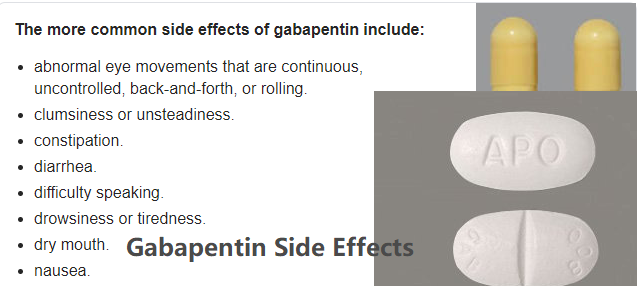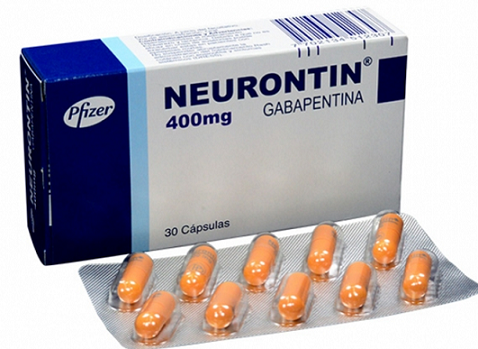Gabapentin (brand name Neurontin) is a medication originally developed for the treatment of epilepsy.
Presently, gabapentin is widely used to relieve pain, especially neuropathic pain. Gabapentin is well tolerated in most patients, has a relatively mild side-effect profile, and passes through the body unmetabolized.
Gabapentin Mechanism of action

Gabapentin interacts with cortical neurons at auxillary subunits of voltage-sensitive calcium channels. Gabapentin increases the synaptic concentration of GABA, enhances GABA responses at non-synaptic sites in neuronal tissues, and reduces the release of mono-amine neurotransmitters.
One of the mechanisms implicated in this effect of gabapentin is the reduction of the axon excitability measured as an amplitude change of the presynaptic fibre volley (FV) in the CA1 area of the hippocampus.
This is mediated through its binding to presynaptic NMDA receptors. Other studies have shown that the antihyperalgesic and antiallodynic effects of gabapentin are mediated by the descending noradrenergic system, resulting in the activation of spinal alpha2-adrenergic receptors. Gabapentin has also been shown to bind and activate the adenosine A1 receptor.
Buy Gabapentin Online
Gabapentin belongs to a class of drugs known as anticonvulsants, used to help control seizures in the treatment of epilepsy.
Neurontin will only be able to control seizures for as long as you take it. It can’t cure epilepsy. The following step after being diagnosed is to work with your doctor in choosing the best treatment options for you.
It is also used to control pain associated with shingles and has been evaluated for pain conditions, including migraine, as its pain-modulating properties may regulate the perception of pain. Anticonvulsant drugs, such as gabapentin, are becoming increasingly popular for migraine prevention.
Gabapentin is an antiepileptic or anticonvulsant treatment originally designed to prevent seizures, but which is now also used to manage certain types of pain and in a variety of other uses.
The medication is also used in veterinary medicine. Note that tablets, capsules or oral solutions designed for human consumption often contain sweeteners which may be poisonous to some species; be sure to buy Gabapentin in veterinary formulations for use in animals.
The medication comes in capsules, which may be opened and mixed into a beverage or soft foods that do not require chewing, though it is difficult to mask its bitter taste.
What should I avoid while taking gabapentin (Neurontin)?
This medication may cause blurred vision or impair your thinking or reactions. Be careful if you drive or do anything that requires you to be alert and able to see clearly.
Avoid taking an antacid within 2 hours before or after you take gabapentin. Antacids can make it harder for your body to absorb gabapentin.
Preventing Seizures
Gabapentin is most commonly prescribed to prevent certain types of seizures:
- Focal seizures
- Mixed Seizures
- Generalized Seizures
As a preventive treatment, Gabapentin may be used in children as young as 3, but is most often prescribed to people 12 years old and up.
The medication is typically taken 3 times per day, and treatment is usually long-term. Patients are usually started on smaller doses which are then increased if needed. The average dose for adults is 900 to 1800 mg per day.
Daily doses are usually divided into 3 smaller doses, taken morning, afternoon, and at bedtime. Doses should be taken at least 4 hours apart, but not more than 12 hours apart.
It may take several weeks for the medication to become noticeably effective. When working, seizures should occur with significantly less frequency or be eliminated entirely. It does not work on all seizures and is not effective for all patients; if effects are not significant after several weeks of use, speak with doctor about alternative options rather than continuing to buy Gabapentin.
Ending treatment abruptly may cause an increase in seizures; speak with a doctor about tapering off the medication.
Pain Relief
Patients planning to buy Gabapentin for pain relief should understand that it only works on very specific types of pain; namely neuropathic pain, or pain caused by damage to the somatosensory system, including:
-
- Postherpetic neuralgia
- Central neuropathic pain
- Diabetic neuropathy
- Fibromyalgia
- Spinal injuries
- Cancer
When given for pain, treatment may last just a few days for flare-ups or weeks or months in cases of chronic pain. Dosage rarely exceeds 1800 mg a day; greater amounts may be taken, but rarely produce additional relief.
Some individuals notice effects within the first day or two of treatment, but it may take several weeks to provide consistent pain relief in chronic conditions.
While some patients find Gabapentin tremendously helpful, others find it has little effect, even when treating the same condition. Speak with a doctor about other options if it is not providing significant relief.
What happens if I overdose (Neurontin)?
Seek emergency medical attention or call the Poison Help line at 1-800-222-1222.
Overdose symptoms may include blurred vision, drowsiness, weakness, slurred speech, or diarrhea.
Other Uses
Gabapentin is used in a wide range of other conditions, though it is not always the most effective option for certain ailments:
-
- Menopausal symptoms
- Uremic pruritus in liver failure
- Restless leg syndrome
- Insomnia
- Anxiety disorders
- Migraines
Many of this product’s off-label uses are somewhat controversial, as some claim there is no evidence the medication provides any benefit in some of the above conditions, while others claim it produces good results for some individuals.
In other cases the medication is recognized as being effective, but is not typically the preferred treatment; in these situations Gabapentin may be given when first-line treatments are ill-advised for some reason.
Patients are not advised to buy Gabapentin for off-label use without doctor collaboration, particularly if there are any preexisting major medical conditions.
The Doctor Ordered It, We Deliver It
Gabapentin800mg.com is the online storefront of a more traditional brick & mortar pharmacy. We offer the same authentic products and employ the same licensed pharmacists as any other pharmacy–you will never receive sub-par products of questionable origin from us.
There are two ways to buy Gabapentin: clients can fax us a preexisting prescription, or our online doctor may issue a prescription to qualifying patients. Simply begin the checkout process for further instructions.
Dosing
The dose of this medicine will be different for different patients. Follow your doctor’s orders or the directions on the label. The following information includes only the average doses of this medicine. If your dose is different, do not change it unless your doctor tells you to do so.
The amount of medicine that you take depends on the strength of the medicine. Also, the number of doses you take each day, the time allowed between doses, and the length of time you take the medicine depend on the medical problem for which you are using the medicine.
- For oral dosage forms (capsules, liquid, and tablets):
- For epilepsy:
- Adults and children 12 years of age and older—At first, 300 milligrams (mg) three times per day. Your doctor may adjust your dose as needed. However, the dose is usually not more than 2400 mg per day.
- Children 3 to 11 years of age—Dose is based on body weight and must be determined by your doctor. The starting dose is 10 to 15 milligrams (mg) per kilogram (kg) of body weight per day and divided in 3 doses. Your doctor may adjust your dose as needed.
- Children younger than 3 years of age—Use and dose must be determined by your doctor.
- For postherpetic neuralgia:
- Adults— At first, 300 milligrams (mg) as a single dose in the evening. Your doctor may adjust your dose as needed. However, the dose is usually not more than 1800 mg per day.
- Children—Use and dose must be determined by your doctor.
- For epilepsy:





